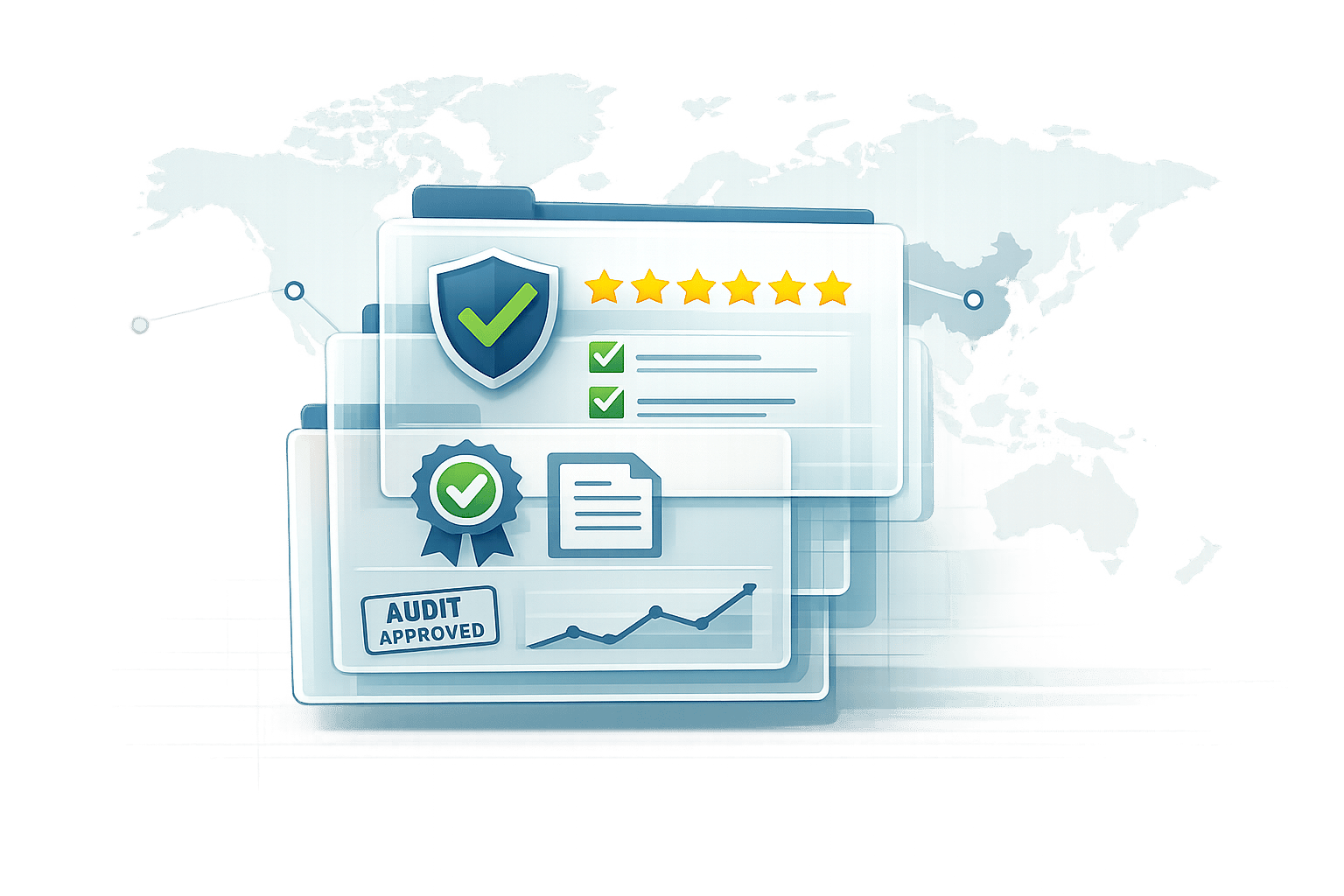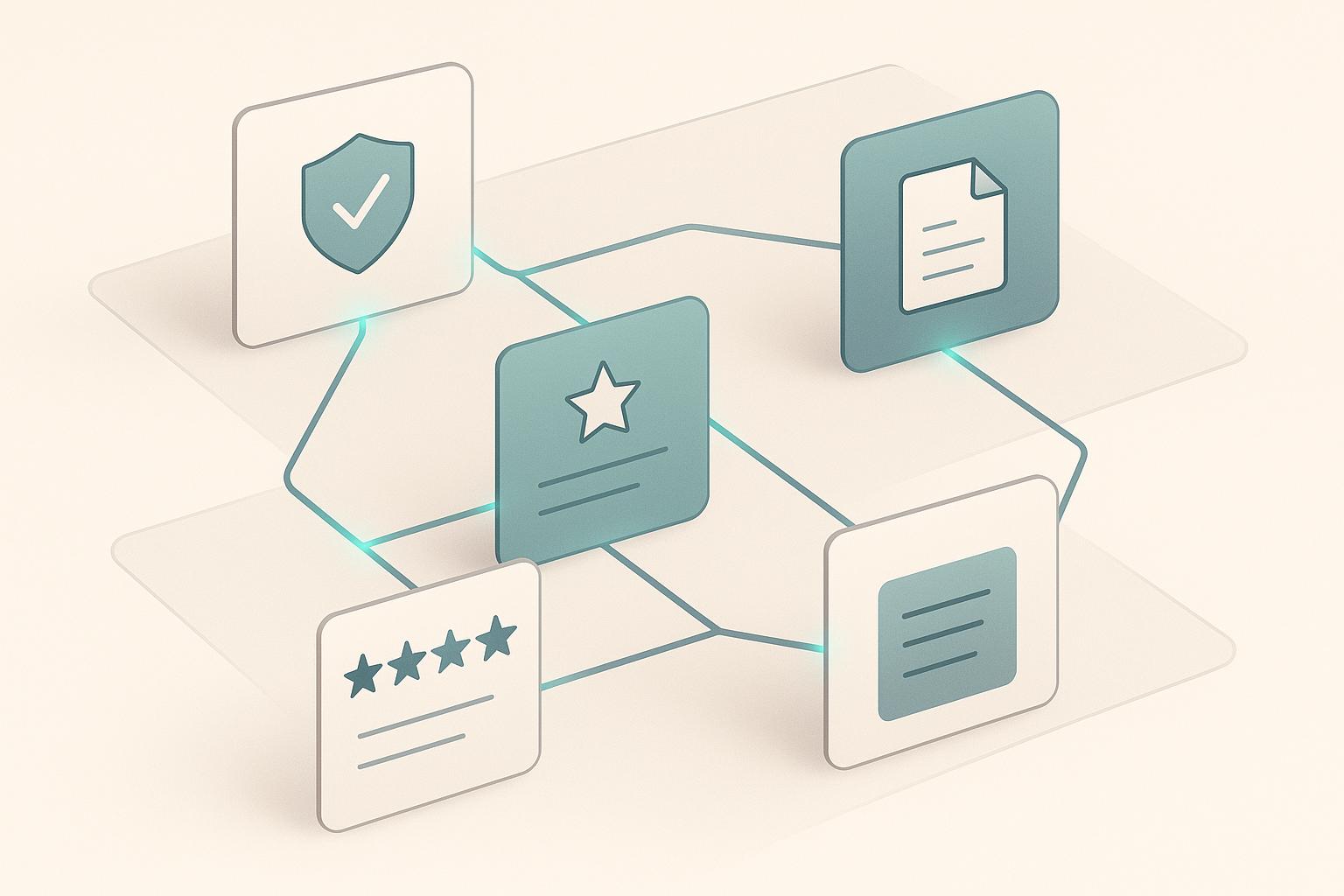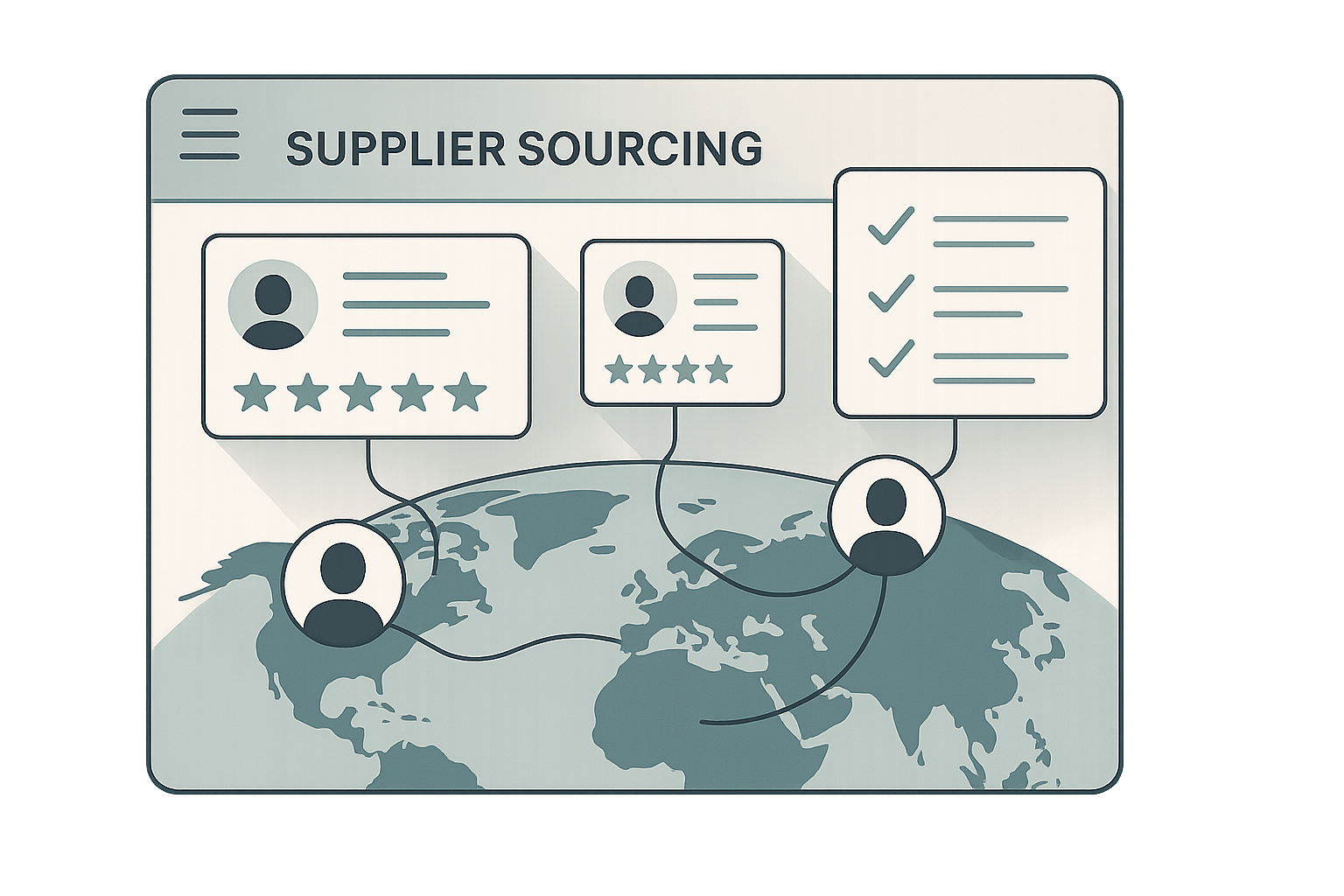Alibaba and DHGate are two popular platforms for sourcing products from Chinese suppliers, but they serve different needs. Alibaba is best for businesses placing bulk orders, offering tools like Trade Assurance and supplier verification for large-scale sourcing. DHGate, on the other hand, caters to buyers needing smaller quantities, such as small businesses or individuals, with no strict minimum order quantities.
Key Highlights:
- Alibaba: Focuses on wholesale with bulk discounts, robust buyer protections, and supplier transparency. However, it requires navigating higher minimum order quantities and a more complex platform.
- DHGate: Allows smaller orders, ideal for testing products or dropshipping, but supplier verification and buyer protections are less rigorous.
Quick Comparison:
| Feature | Alibaba | DHGate |
|---|---|---|
| Target Audience | Businesses needing bulk orders | Small businesses, individuals |
| Order Size | High MOQs (hundreds/thousands) | Single items or small batches |
| Pricing | Bulk discounts | Higher per-unit costs |
| Buyer Protection | Trade Assurance escrow | Basic escrow system |
| Supplier Verification | Detailed third-party audits | Limited, buyer-initiated reviews |
| Payment Options | Wire transfer, credit cards, "Pay Later" | No PayPal, limited options |
Choose Alibaba for large-scale sourcing and DHGate for smaller, flexible orders. For a more efficient supplier search, tools like ForthSource combine listings from both platforms and others, simplifying comparisons.
DH Gate vs Alibaba - Sourcing Products from Chinese Suppliers
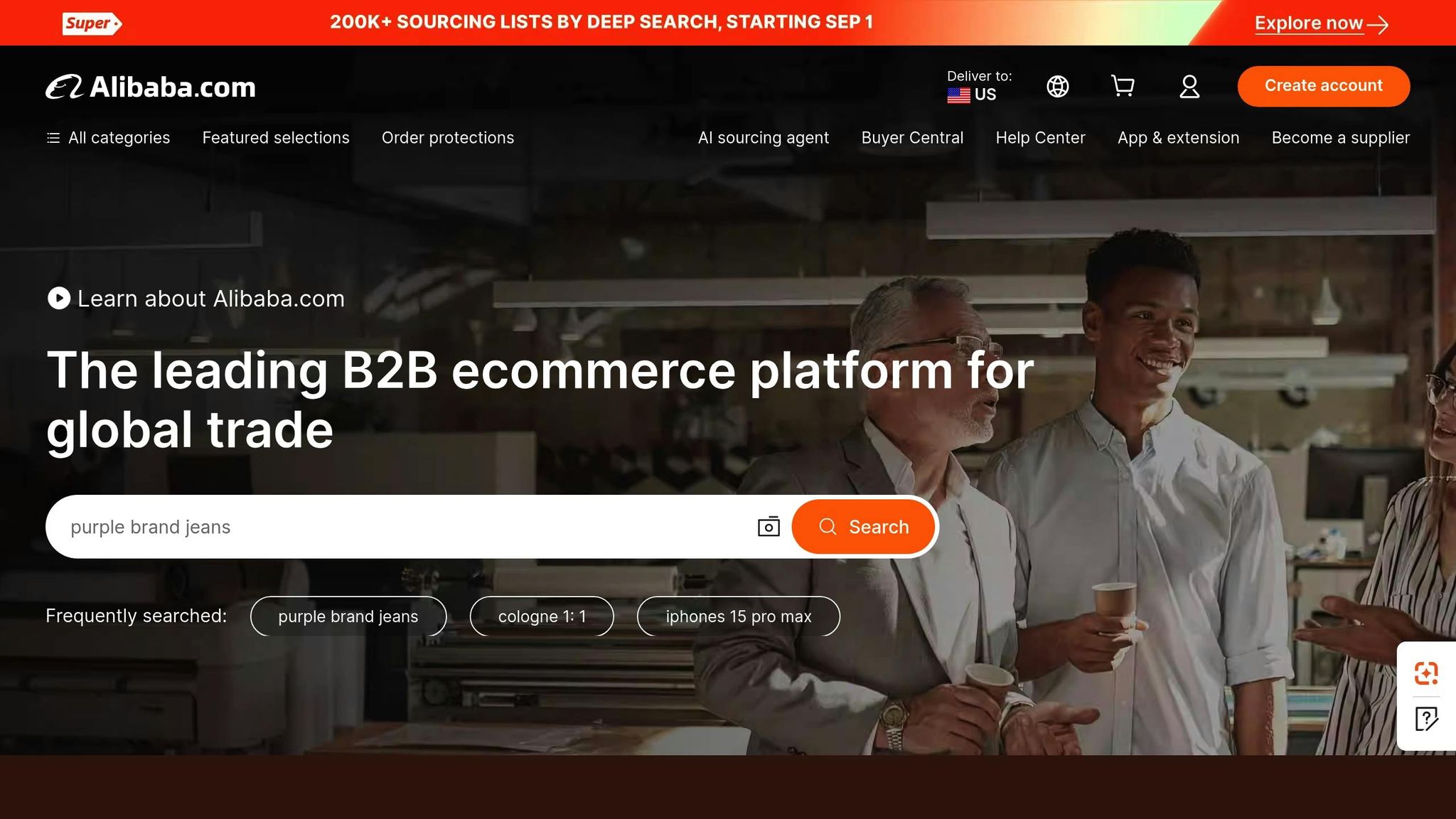
Alibaba Overview
For U.S. buyers aiming to streamline their sourcing efforts, getting familiar with Alibaba’s structure is crucial. Founded in 1999 by Jack Ma, Alibaba has grown into a leading B2B marketplace that plays a major role in global trade.
Business Model and Target Audience
Alibaba operates with a wholesale-first approach, catering to businesses that need large quantities of goods. The platform is tailored for manufacturers, distributors, retailers, and sourcing managers who prioritize building long-term supplier relationships over one-time purchases.
The typical buyer on Alibaba is a business owner or procurement professional equipped to manage bulk orders, often with specific minimum quantity requirements. This makes the platform especially appealing to established businesses with well-defined inventory needs.
Key Strengths
One of Alibaba’s standout features is its robust verification and buyer protection systems. The platform has processed over 160 million Trade Assurance orders, with more than 37 million buyers using this free escrow service and over 200,000 suppliers participating in the program.
The Trade Assurance program ensures payments are held until buyers confirm they’ve received their products. This safeguards against issues like unshipped orders, product quality concerns, and delivery delays. As Ezequiel Karpf of MyFamilyBuilders puts it:
"When I see they are trade assured, and I know Alibaba.com is behind my purchases, well that's a lot of security for me."
Alibaba also employs a tiered supplier verification system. Suppliers in the "Verified Supplier" tier are vetted by independent third parties like SGS and TUV Rheinland. These suppliers provide detailed inspection reports, verified videos, and 360° VR views of their operations, giving buyers a transparent look into their capabilities.
This rigorous verification process delivers measurable benefits. Verified suppliers see a 330% boost in product page views and a 140% increase in direct purchase requests. Heather Green, owner of SillyFarm Supplies, highlights the value of this system:
"Verified Suppliers have been verified by an independent third-party with a thorough company inspection. This allows me to thoroughly analyze the supplier's production capabilities."
Alibaba’s global reach is another major asset. Buyers can compare a wide range of suppliers, negotiate terms, and find partners that meet their specific needs for quality, capacity, and pricing.
Challenges for New Users
While Alibaba offers numerous advantages, it can be daunting for newcomers to navigate. Its B2B focus assumes users have a working knowledge of international trade, shipping logistics, and quality control processes.
For smaller businesses or those testing new products, high minimum order quantities can be a hurdle, often tying up substantial capital. Additionally, the platform’s vast supplier base requires buyers to conduct thorough due diligence, which involves vetting multiple suppliers and negotiating terms. For first-time users, understanding supplier verification levels and knowing what questions to ask can feel overwhelming.
Language barriers may also pose challenges. While many suppliers employ English-speaking representatives, detailed discussions about technical specifications, customizations, or quality standards often require extended back-and-forth communication to ensure clarity.
Finally, Alibaba’s fee structure and payment processes can confuse new users. Learning when to use Trade Assurance, structuring payments correctly, and understanding which protections apply to different transactions can involve a steep learning curve.
Next, we’ll take a closer look at DHGate, comparing its business model and features to Alibaba’s offerings.
DHGate Overview
DHGate stands out by catering to smaller businesses and individual buyers who value flexibility in order quantities, setting itself apart from platforms like Alibaba that focus on wholesale buyers. It’s become a go-to platform for small-to-medium businesses, budding entrepreneurs, and dropshippers who need to source low-quantity orders. This approach is particularly appealing for testing new markets or fulfilling customer orders without the burden of high minimum order requirements often seen in traditional B2B marketplaces. Let’s dive into what makes DHGate an attractive choice for buyers seeking minimal order commitments.
Business Model and Target Audience
DHGate operates as a hybrid marketplace, blending elements of wholesale and retail. What sets it apart is its ability to accommodate orders as small as a single item. This flexibility is ideal for new businesses looking to test products without significant upfront investment, as well as for established companies seeking to expand their inventory without overcommitting.
Key Features and Benefits
One of DHGate’s standout features is its extremely low order requirements. In July 2025, the platform announced that buyers could purchase a single item, a policy that eliminates the typical minimum order requirements found on many other platforms. This approach significantly lowers the financial risks for new entrepreneurs, giving them the freedom to experiment with products. For established businesses, it provides an easy way to explore new product categories or supplement existing inventories without taking on large stock commitments.
Pricing Comparison
Understanding how Alibaba and DHGate approach pricing is essential for shaping your sourcing strategy. Each platform has its own pricing system, which can significantly affect your costs as a US buyer.
Pricing Structures
Alibaba's pricing thrives on bulk purchasing discounts. Suppliers often use tiered pricing, meaning the more you order, the lower the price per unit. For instance, you might pay $5.00 per unit for 100 items but only $3.50 per unit for 1,000 items. This model is ideal if you're looking to scale up and secure lower costs.
DHGate, on the other hand, offers flexibility for smaller orders. It allows you to purchase single items or smaller quantities, making it a good option for testing products without committing to large investments. However, this flexibility comes at a cost - you won’t find the steep bulk discounts that Alibaba provides.
Transaction and Payment Processes
Both platforms rely on escrow systems to hold funds until you confirm receipt of your order. However, their payment methods and processes differ in ways that could impact your experience.
Alibaba offers a wide range of payment options, including wire transfers, credit cards, and digital platforms. A noteworthy addition for US buyers is the "Pay Later for Business" feature introduced on June 30, 2025. This service, developed with fintech provider Balance, uses AI to offer real-time credit assessments and high approval rates, especially for businesses that may struggle with traditional financing.
DHGate, however, no longer supports PayPal. While Alibaba still accepts PayPal, it comes with associated fees. For US buyers, currency conversion fees can also vary: traditional wire transfers to China often include a 2–4% exchange fee, while digital payments typically charge 0.5–1% in transfer fees. For established supplier relationships on Alibaba, direct digital transfers can save costs. If you’re working with a new supplier, Trade Assurance or Letters of Credit offer added security, though they may come with higher fees.
On DHGate, always use their escrow system to safeguard your payments. Avoid sending funds directly to sellers, as this can increase risks.
Fees and Refunds
The platforms’ fee structures and refund policies reveal further differences. For DHGate purchases, foreign transaction fees from banks or credit card providers can add unexpected costs.
When it comes to refunds, Alibaba’s Trade Assurance program provides robust buyer protection, covering payment security, product quality, and on-time delivery. Refunds are typically processed within 30 or 60 days of delivery. For orders under $3,000, US buyers also benefit from the "Easy Return & Refund" policy, allowing free returns to a local warehouse within 30 days if products are defective, incorrect, or damaged.
DHGate’s refund process is more complex. While they guarantee money back for returns initiated within 3–90 days of receiving the order, buyers usually have to prepay return shipping fees. These fees are only reimbursed to the buyer’s DHpay account after the seller confirms receipt of the returned item. Additionally, sellers often refuse to cover return postage, increasing costs and risks for buyers.
Dispute resolution timelines also vary. DHGate requires disputes to be filed within 5–90 days after the order is shipped, depending on the shipping method. Both platforms offer mediation if buyers and sellers cannot agree, but securing full refunds can be challenging. On DHGate, partial refunds are more common, and some buyers resort to chargebacks through their banks when platform-level resolutions fail.
sbb-itb-633367f
Credibility and Buyer Protection
When sourcing products from China, ensuring credibility and buyer protection is essential for secure and reliable transactions. Both Alibaba and DHGate offer distinct methods for supplier verification and buyer protection, which significantly impact the level of trust and risk for US buyers.
Supplier Verification Processes
Alibaba takes a detailed approach to supplier verification through its paid Verified Supplier Program. This program involves third-party audits that confirm a supplier’s legitimacy and manufacturing capabilities. The process includes on-site inspections of facilities, business records, and operations. To provide additional transparency, Alibaba shares assessment reports, videos, and even 360° VR views of supplier facilities. These tools help US buyers better understand the supplier’s operations before committing to a purchase.
On the other hand, DHGate claims its suppliers are “verified” through third-party checks and approval by DHGate itself. However, the platform places a higher emphasis on buyer initiative. Buyers are encouraged to independently verify supplier credentials, reviews, and certifications through resources like the Ministry of Commerce or SAIC. Requesting product samples is also recommended. DHGate highlights an "ACE status" for certain stores, which serves as an extra indicator of seller performance.
Buyer Protection Programs
Once suppliers are verified, buyer protection programs play a key role in safeguarding transactions. Alibaba offers Trade Assurance, a program designed to protect payments, ensure product quality, and guarantee on-time delivery. Payments are held in escrow until the buyer confirms satisfaction. This program is particularly beneficial for larger B2B transactions, where the stakes are higher, and comprehensive support is crucial.
DHGate, meanwhile, provides buyer protection for every order. This includes full refunds for non-delivery or late shipments and partial refunds for quality issues or incorrect items. The platform’s buyer protection extends for 30 days beyond the estimated delivery date, with disputes typically resolved in 3-5 business days. This program is more tailored to smaller-scale purchases, offering a straightforward resolution process.
Trust and Risk for US Buyers
The differences in verification and protection systems lead to varying levels of trust and risk for US buyers. Alibaba’s in-depth verification, supported by audit reports and facility documentation, is well-suited for larger, high-risk transactions. However, it’s worth noting that enrollment in Trade Assurance is optional for sellers, so not all transactions may include this protection.
In contrast, DHGate shifts more responsibility onto buyers to thoroughly vet suppliers. While every order is covered by buyer protection, the platform’s verification details may not be as comprehensive as Alibaba’s. For US buyers, the decision often comes down to the scale of the transaction and their risk tolerance. Alibaba is ideal for large-scale, high-stakes orders, while DHGate is a better fit for smaller, less risky purchases.
To minimize risks, buyers should carefully vet suppliers by reviewing ratings, feedback (aiming for at least 95% positive reviews), and verification statuses. Taking these extra steps can help ensure a smoother and safer transaction.
Choosing the Right Platform for US Businesses
When deciding between Alibaba and DHGate, it's essential to consider how each platform aligns with your business model and order volume. Both cater to different needs, so understanding their strengths can help you make the best choice for your sourcing strategy.
Matching Platforms to Your Sourcing Needs
Alibaba is ideal for businesses planning to place large orders. It caters to wholesalers, retailers, and larger enterprises, offering access to a wide network of suppliers. Many of these suppliers provide customization options, making it a great fit if you need bulk quantities with specific product details.
DHGate, on the other hand, is more suitable for small to medium-sized businesses and individual buyers. Its lower minimum order requirements make it perfect for testing new products, fulfilling smaller orders, or running dropshipping operations.
Tips for US Businesses
If you're testing the waters or operating on a smaller scale, DHGate is a practical choice due to its flexibility with minimum order sizes. However, if you're managing large-scale sourcing needs or require customized products, Alibaba is the platform to consider.
In short, use DHGate for small-scale or trial orders and turn to Alibaba for bulk and personalized sourcing.
Smart Supplier Discovery with ForthSource
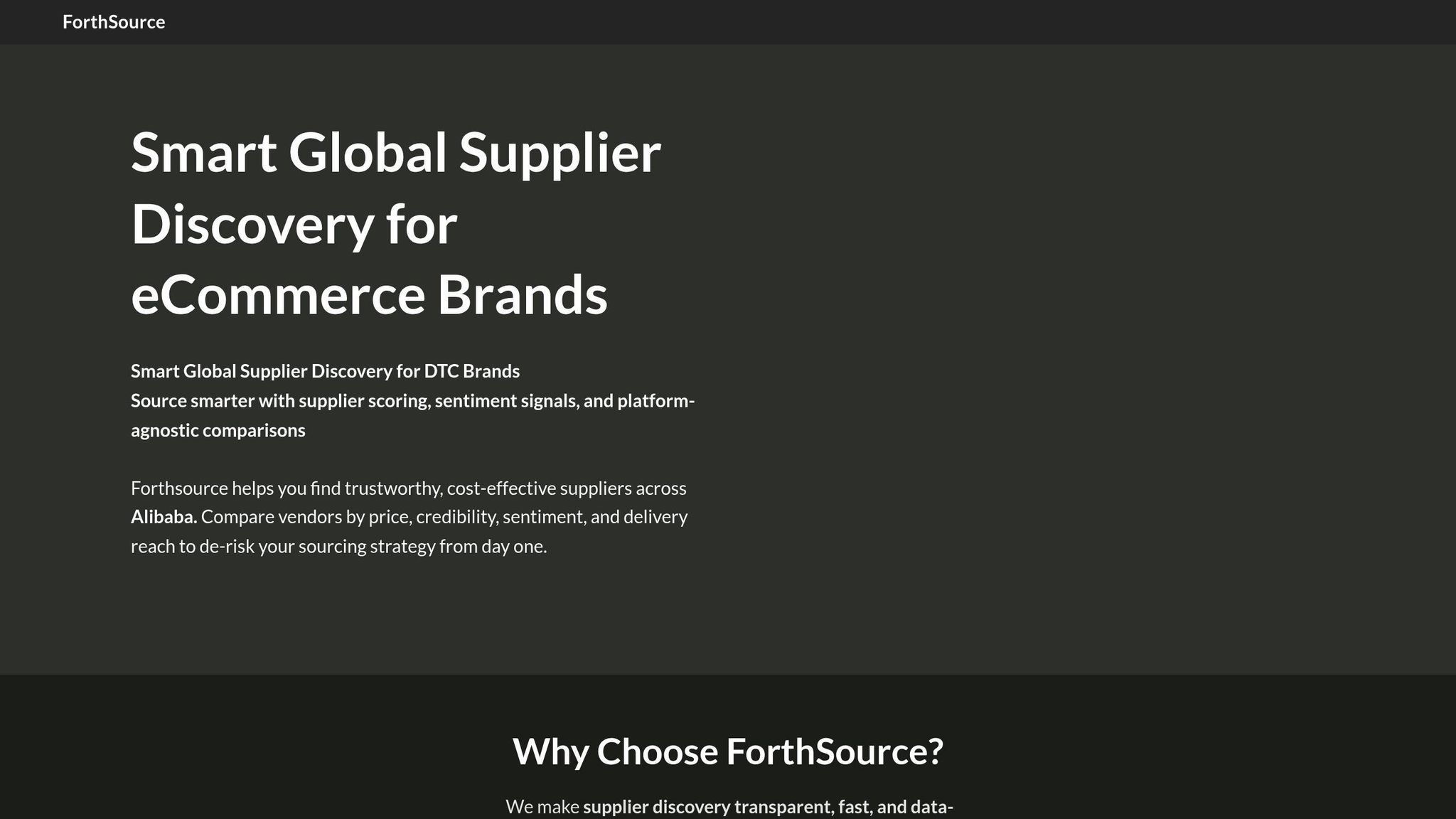
When deciding between Alibaba and DHGate, the process can feel overwhelming. Enter ForthSource - a smarter alternative that simplifies supplier discovery. By combining suppliers from Alibaba, DHGate, and over 50 other platforms, ForthSource provides US businesses with a single, comprehensive view of sourcing options. No more hopping between multiple websites; this tool brings everything together in one place, enhancing the supplier comparison process discussed earlier.
ForthSource Features and Benefits
ForthSource stands out thanks to its proprietary scoring system, which evaluates suppliers based on critical factors like price competitiveness, credibility, review sentiment, and data quality. This takes much of the guesswork out of evaluating suppliers manually.
With ForthSource, you can instantly compare supplier listings side-by-side from platforms like Alibaba, DHGate, and AliExpress. Suppliers are ranked by pricing accuracy, data completeness, reputation, and verified reviews. For those wary of fake reviews, ForthSource Pro goes further by incorporating trust insights from sources such as Google Reviews, Trustpilot, and public web data.
"Unlock enhanced trust insights from Google Reviews, Trustpilot, and public web data, no more sifting through fake 5-star ratings." - ForthSource.io
How ForthSource Simplifies Sourcing
Traditional supplier discovery often involves tedious back-and-forth between platforms, manually comparing prices, and assessing credibility with limited information. ForthSource eliminates this hassle by using real-time performance rankings, making decision-making faster and more efficient.
Its search function delivers ranked supplier options in seconds, allowing US businesses to quickly identify the best fit for their needs. Alex Chan, Supply Lead at Luma Goods, shared how ForthSource transformed their sourcing process:
"We cut sourcing time by 40% using ForthSource's scoring system. A game changer." - Alex Chan, Supply Lead at Luma Goods
For businesses that prioritize speed and reliability, this level of efficiency is invaluable.
Why ForthSource Works for US Businesses
ForthSource is tailored to address the unique challenges US buyers face when sourcing international suppliers. It removes broker fees and RFQ barriers, offering direct and transparent access to supplier pages.
"We make supplier discovery transparent, fast, and data-backed for DTC brands scaling globally without the sourcing guesswork." - ForthSource.io
For direct-to-consumer (DTC) brands and sourcing managers, ForthSource provides domain trust metrics to help identify legitimate suppliers. Its robust search filters let users refine results based on price competitiveness, platform preferences, or seller verification status - making it easier to find suppliers that meet specific needs.
ForthSource operates on a freemium model, giving businesses a chance to explore its capabilities at no cost. With the free version, users can access three enhanced suppliers per search. Paid plans unlock access to 10+ enhanced suppliers per query, along with advanced features for even deeper supplier insights.
Conclusion
Choosing between Alibaba and DHGate ultimately comes down to your sourcing needs and the size of your orders.
Alibaba is the go-to platform for large-scale B2B sourcing. It offers bulk discounts, customization options, and a robust Trade Assurance program to secure payments and ensure quality. This makes it ideal for businesses looking to place large orders with confidence in supplier reliability.
On the other hand, DHGate is better suited for smaller orders, catering to small-to-medium businesses and individual buyers. With lower minimum order quantities (MOQs) and shipping times ranging from 3 to 15 days for ready-to-ship products, it’s a faster option for consumer goods. However, while DHGate provides buyer protection on every order, its dispute resolution process has faced criticism for being less buyer-friendly compared to Alibaba’s more extensive protections.
Beyond price and order size, quality and supplier verification are critical factors. Alibaba’s rigorous supplier vetting typically results in higher quality products, whereas DHGate’s offerings can vary more widely. For U.S.-based businesses, it’s essential to thoroughly research suppliers on both platforms by reviewing ratings, customer feedback, and verification statuses before placing an order.
For a more efficient approach to supplier discovery, consider using ForthSource. This platform aggregates supplier options from Alibaba, DHGate, and over 50 other sources. Its proprietary scoring system evaluates suppliers based on pricing, credibility, and customer reviews, taking the guesswork out of the process. For U.S. businesses seeking a data-driven and streamlined sourcing solution, ForthSource can simplify decision-making and improve sourcing efficiency.
FAQs
How do Alibaba and DHGate differ in buyer protection and supplier verification?
Alibaba takes buyer protection seriously with its Trade Assurance program. This program offers secure payment methods, a structured dispute resolution process, and detailed third-party supplier verification. These verifications often include independent inspections and in-depth evaluations to confirm a supplier's reliability.
In comparison, DHGate provides buyer protection through a 90-day dispute window, which allows buyers to request refunds or resolutions for defective or misrepresented products. However, its supplier verification relies primarily on the Verified Supplier program, which doesn't match the thoroughness of Alibaba's approach.
For buyers who prioritize security and reliability, Alibaba's strict safeguards and comprehensive supplier checks make it the better option.
What makes DHGate's order size options more suitable for small businesses and individuals compared to Alibaba?
DHGate stands out as a great option for small businesses and individuals because it lets buyers order smaller quantities, unlike Alibaba, which typically emphasizes bulk purchasing. This approach helps keep initial costs down and minimizes inventory risks, making it easier to experiment with new products or serve specialized markets.
For startups and solo entrepreneurs, the ability to order in smaller amounts through DHGate means they can secure products at a lower cost without the pressure of committing to large-scale orders. It’s a smart choice for those wanting to grow gradually and on their own terms.
What should U.S. businesses consider when choosing between Alibaba and DHGate for product sourcing?
When choosing between Alibaba and DHGate, U.S. businesses should weigh a few important factors to find the best fit for their sourcing needs:
- Target Audience: Alibaba is geared towards large enterprises and wholesalers, while DHGate is often a better choice for small-to-medium-sized businesses and individual buyers.
- Pricing and Product Range: Alibaba excels in offering bulk purchasing options and customizable products. On the other hand, DHGate is known for its lower prices and a mix of genuine and replica items.
- Buyer Protection: DHGate includes buyer protection on every order, which can be appealing for businesses focused on minimizing risks and building trust.
Other aspects to keep in mind include minimum order quantities (MOQs), shipping times, and how user-friendly each platform is. Taking these factors into account can help U.S. businesses make a decision that aligns with their specific goals and market demands.
